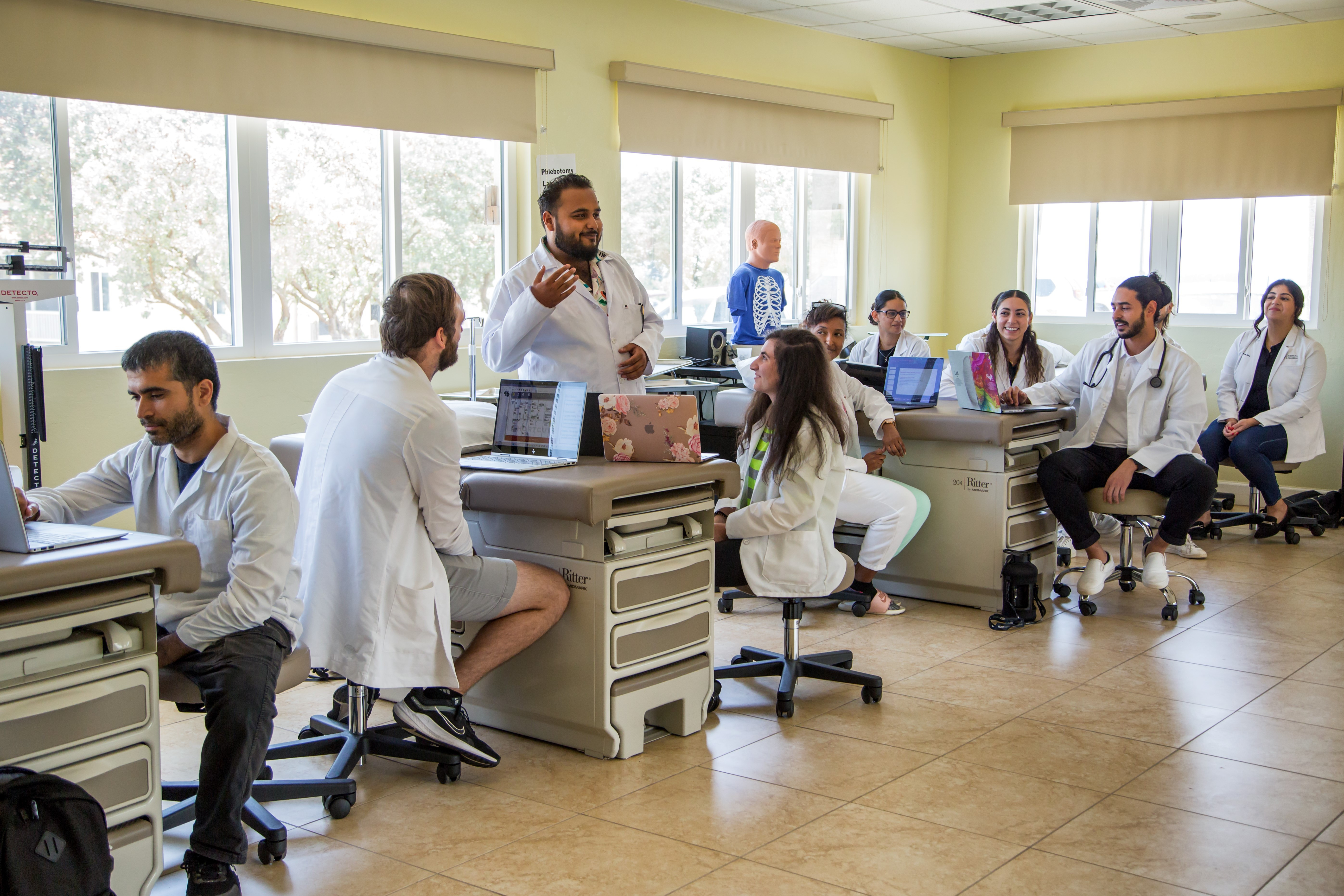Discover the possibilities of transitioning from nursing to becoming a medical doctor and explore how to make your dream a reality.
Transitioning from a Registered Nurse (RN) to a Medical Doctor (MD) is achievable, opening new avenues in healthcare. The team at thebootdoctor.net provides a clear roadmap that outlines the necessary steps and highlights the advantages of expanding your role in medicine and managing foot health. If you’re ready to elevate your patient care impact, diagnostic proficiency, and overall career trajectory, read on to learn more about earning your medical degree, enhancing medical protocols, and improving patient outcomes.
1. Why Consider Going From RN to MD?
Why should an RN consider becoming a doctor? As a Registered Nurse, your involvement in patient well-being is already significant, yet becoming an MD can substantially amplify your capabilities and open more doors. You will acquire greater independence, enabling crucial decisions in patient care, diagnosing intricate conditions, and prescribing treatments beyond an RN’s or even a Nurse Practitioner’s scope. Many nurses pursue medical degrees to specialize in areas such as surgery, pediatrics, or internal medicine, enhancing their career trajectory and improving earning potential and clinical outcomes.
For many RNs, one of the most compelling motivations is the chance to significantly affect patient treatment and foot health. Earning a medical degree empowers you to assume leadership roles, influence healthcare standards, and improve treatment approaches.
 How to Transition From RN to MD
How to Transition From RN to MD
2. What Are The Key Steps From RN to MD?
Curious about the transition steps? The journey from RN to MD requires dedication. Here’s a detailed step-by-step guide:
2.1. Obtain a Bachelor’s Degree
A foundational step towards medical school is typically a bachelor’s degree, ideally in a science-related discipline like biology or chemistry. Many RNs already possess a Bachelor of Science in Nursing (BSN); however, securing one is the initial step if you don’t. The team at thebootdoctor.net emphasizes that most medical schools seek candidates with a robust foundation in scientific subjects. Ensure your nursing degree encompasses prerequisites like organic chemistry or general biology; if not, completing these courses beforehand is essential.
However, if you don’t have a Bachelor’s degree and would prefer not to spend the 3-4 years necessary to acquire one, there are other alternatives as well. Medical University of the Americas offers several pre-med program options that allow students to begin pursuing their MD degree without an undergraduate degree.
2.2. Select Medical Schools
Choosing the right medical school is a critical decision that the experts at thebootdoctor.net advise taking seriously. Location, program structure, resources for non-traditional students, and clinical rotation options are important factors to consider. Medical University of the Americas (MUA) offers programs meticulously designed to provide a robust foundation in both Basic Sciences and Clinical Medicine. Conduct comprehensive research on the schools you’re interested in, and tailor your applications to meet each institution’s specific requirements to enhance your chances of acceptance.
2.3. Master the MCAT
The Medical College Admission Test (MCAT) is an essential requirement for nearly all medical schools in the U.S. Thebootdoctor.net recognizes that this standardized test assesses your scientific knowledge, reasoning skills, and critical thinking abilities. RNs with bachelor’s degrees and practical clinical experience often have a solid foundation for MCAT preparation. However, intensive study is crucial, as a high score can significantly improve your prospects of medical school acceptance.
2.4. Complete Medical School
Medical school is a transformative four-year journey. The first two years focus on foundational sciences, while the last two years involve clinical rotations across various specialties, including internal medicine, surgery, and pediatrics. As emphasized by thebootdoctor.net, your prior nursing experience will prove invaluable, as you’ll already be acquainted with medical terminology, patient care protocols, and clinical environments.
2.5. Residency and Licensure
After medical school, the next critical phase is completing a residency program. These programs typically last three to seven years, varying by specialty. Following residency, you must pass licensing exams to become a practicing physician. Residency is where you refine your skills and specialize in your chosen area of medicine.
3. How Long Does It Really Take to Transition From RN to MD?
How long is the complete journey? Transitioning from RN to MD can vary considerably based on your educational background and career goals, according to the team at thebootdoctor.net. This timeline includes earning a bachelor’s degree (if necessary), completing four years of medical school, and finishing a residency program (lasting 3-7 years). MUA offers a 4-year MD program designed to equip students with essential knowledge and clinical skills through hands-on training, personalized support, and comprehensive student services.
4. What Are the Medical School Costs for Nurses?
Medical school expenses can vary. Thebootdoctor.net notes that MUA offers competitively priced programs, often more affordable than many U.S.-based medical schools. Nurses should budget for tuition, books, supplies, and living expenses over four years.
Medical school costs can be substantial, with a median four-year cost of $268,476 for resident students. However, financial aid, scholarships, and grants can help offset these expenses. MUA offers affordable tuition compared to many U.S. medical schools, with tuition and fees costing $180,975. Scholarships are also available for eligible students.
5. How Can Nurses Finance Their Medical Education?
Financing medical school may seem daunting, but resources are available, including scholarships, grants, and student loans. Thebootdoctor.net points out that MUA provides financial aid for qualified students. It’s vital to explore all funding options and create a solid financial plan before embarking on your journey from nurse to doctor.
6. What Are The RN to MD Program Options?
Are there specific RN to MD programs? While dedicated bridge programs from nurse practitioner to medical doctor are rare, thebootdoctor.net acknowledges that medical schools like MUA offer comprehensive MD programs. These programs allow you to leverage your nursing experience toward your medical education and emphasize essential physician qualities such as empathy, critical thinking, and leadership, skills you’ve already begun developing as a nurse.
 MUA Clinical Lab
MUA Clinical Lab
7. What Is The Salary Difference Between an MD vs. RN?
What are the potential earnings? According to the US Bureau of Labor Statistics, the average annual salary for an RN in 2023 was around $94,480, while primary care physicians earned an average of $245,450 per year. This significant salary increase is a major incentive for RNs transitioning to become doctors.
8. What Are Some Essential Tips for RNs Who Want to Become MDs?
The team at thebootdoctor.net shares essential tips for nurses aiming to become doctors:
- Emphasize your nursing experience: Highlight your clinical experience to showcase your readiness for medical school.
- Network with professionals: Engage with doctors and medical students who have successfully transitioned from nursing.
- Focus on MCAT preparation (for U.S. students): Aim for a high score to improve your chances of acceptance.
Transitioning from a nurse to a doctor is challenging yet rewarding, opening new doors in healthcare. Medical University of the Americas offers a comprehensive MD program to help you achieve your goals. Explore their Basic Science and Clinical Medicine programs.
 MD Program Prerequisites
MD Program Prerequisites
To see what it will be like when you complete medical school and graduate with your Doctor of Medicine (MD) degree, check out this video from our 2024 commencement:
If you’d like to learn more about MUA or chat about going from RN to MD, please don’t hesitate to contact us.
9. Transitioning from RN to MD: Addressing Foot Health Concerns
Registered Nurses transitioning to medical doctors are uniquely positioned to address foot health issues with enhanced expertise. Here’s how expanding medical knowledge can benefit patients:
9.1. Enhanced Diagnostic Skills
Medical school equips future doctors with advanced diagnostic techniques. RNs turned MDs can more accurately identify the root causes of foot pain, infections, and deformities, leading to more effective treatment plans. Accurate diagnosis is crucial in preventing chronic conditions and improving patient outcomes related to foot health.
9.2. Comprehensive Treatment Options
Becoming an MD expands the range of treatment options available. While nurses can provide essential care and education, doctors can prescribe medications, perform surgeries, and offer specialized treatments for complex foot conditions. This comprehensive approach ensures patients receive the most appropriate and effective care tailored to their specific needs.
9.3. Preventative Care Expertise
With additional medical training, RNs turned MDs can offer enhanced preventative care strategies. They can better educate patients on proper foot hygiene, footwear choices, and early intervention techniques to prevent foot problems from developing. This focus on prevention can significantly reduce the incidence of foot-related complications, especially in vulnerable populations like diabetics and the elderly.
9.4. Addressing Systemic Health Issues
Foot problems are often linked to systemic health issues such as diabetes, arthritis, and vascular diseases. MDs are trained to understand these connections and provide holistic care that addresses both the foot condition and the underlying medical problem. This comprehensive approach leads to better overall health outcomes for patients.
9.5. Leadership and Advocacy
RNs who become MDs often take on leadership roles in healthcare settings. This allows them to advocate for improved foot care protocols, promote awareness of foot health issues, and implement programs to reduce foot-related complications in their communities. Their unique perspective as former nurses enhances their ability to drive positive change in foot care practices.
9.6. Research and Innovation
MDs are actively involved in medical research, contributing to advances in foot care treatments and technologies. RNs turned MDs can leverage their clinical experience and research skills to develop innovative solutions for foot problems, improving the quality of life for their patients.
9.7. Specialized Care for Athletes
Foot health is critical for athletes, and MDs with a background in nursing can provide specialized care to this population. They can diagnose and treat sports-related foot injuries, offer advice on proper footwear and training techniques, and develop rehabilitation plans to help athletes return to their sport safely and effectively.
9.8. Management of Chronic Conditions
Chronic conditions like diabetes and arthritis often lead to foot complications. MDs are equipped to manage these conditions comprehensively, providing advanced wound care, prescribing medications to control pain and inflammation, and coordinating care with other specialists to optimize patient outcomes.
9.9. Early Intervention for Children
Foot problems in children can affect their development and overall health. MDs can diagnose and treat pediatric foot conditions early, preventing long-term complications and ensuring children have healthy, functional feet as they grow.
9.10. Enhanced Patient Education
With their expanded medical knowledge, RNs turned MDs can provide more detailed and effective patient education. They can explain complex medical concepts in an accessible way, empowering patients to take an active role in their foot care and make informed decisions about their health.
By transitioning from RN to MD, healthcare professionals can significantly enhance their ability to address foot health issues comprehensively, improving patient outcomes and contributing to advances in foot care practices.
10. FAQs About the Journey from Nurse to Doctor
Still have questions? Here are some frequently asked questions to clarify the path from nurse to doctor:
10.1. What is the difference between an RN and an MD?
A nurse provides patient care, while a doctor diagnoses and treats medical conditions. Doctors typically have more autonomy and a broader scope of practice.
10.2. Does a BSN satisfy medical school prerequisites?
A Bachelor of Science in Nursing (BSN) can fulfill the prerequisite requirements for medical school, however this is not guaranteed. You may need to complete additional prerequisite courses in sciences like chemistry and physics. Contact the MUA admissions department to learn more.
10.3. How long does it take for an RN to become an MD?
The length of time spent becoming a medical doctor depends on a variety of factors. If an RN had an appropriate undergraduate degree and wanted to pursue a career in pediatrics, that would take approximately seven years (four years of medical school and three years of residency training). However, if a person decided to pursue a four-year undergraduate degree and wanted to eventually become a surgeon, that could take up to 15 years (four year undergraduate degree, four years of medical school, seven years of surgical residency training).
10.4. What are the steps after nursing to become a doctor?
You’ll need to complete the required prerequisites, pass the MCAT (U.S. students), complete medical school and finish a residency program. The final step will involve passing board certifications exams and achieving your license to practice independently.
10.5. Is a medical degree worth it?
The decision to pursue a medical degree is highly personal and depends on individual career goals, financial considerations, and passion for medicine. While it requires significant time and financial investment, the rewards include intellectual stimulation, the opportunity to make a profound impact on patients’ lives, and enhanced career prospects. Many physicians find deep satisfaction in their ability to improve health outcomes and contribute to medical advancements.
 SABA Email Banner Template
SABA Email Banner Template
Useful links
PROGRAMS
HOW TO APPLY
TUITION
REGISTER FOR EVENTS
Get in touch for more information
If you are experiencing any foot or ankle issues, remember to contact the experts at thebootdoctor.net for advice, treatment, and care. Our dedicated team is committed to providing you with the best possible support to ensure your feet are healthy and happy.
Address: 6565 Fannin St, Houston, TX 77030, United States
Phone: +1 (713) 791-1414
Website: thebootdoctor.net

